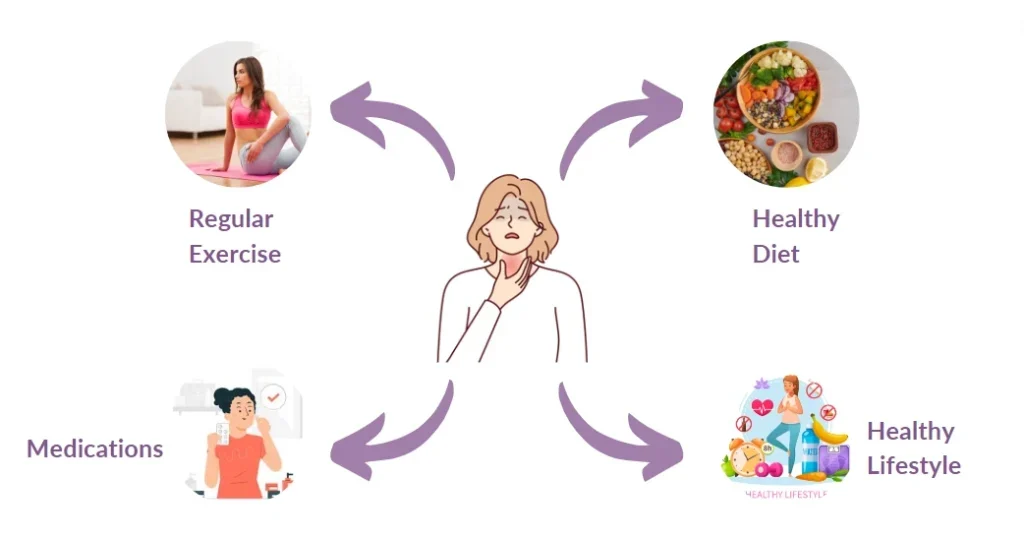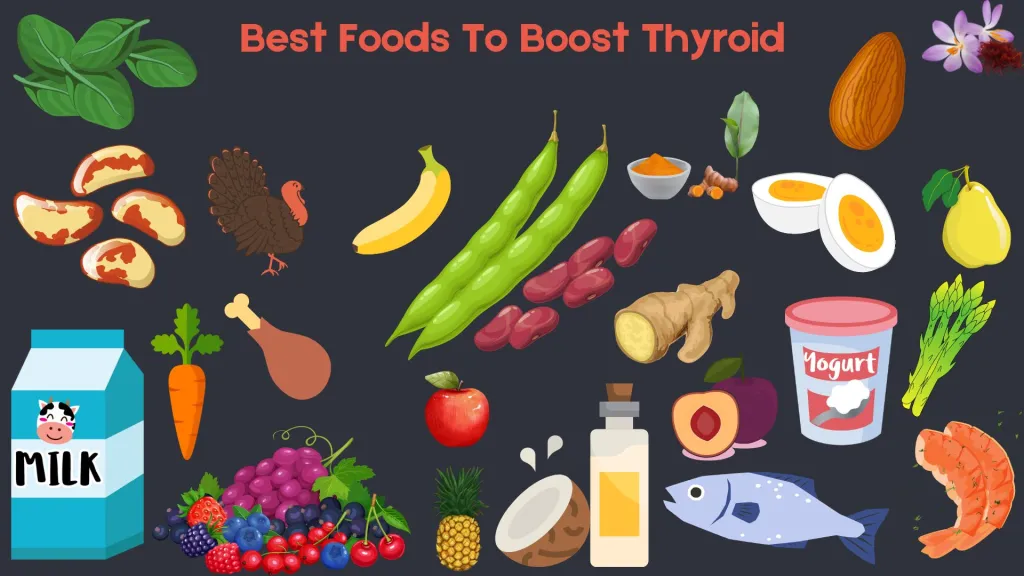Understanding Female Thyroid Conditions:
The thyroid gland is essential for controlling hormone balance, mood, energy, and metabolism. Thyroid diseases are statistically five to eight times more common in women than in men.How to reduce thyroid in women
Typical thyroid disorders include:
- Underactive thyroid, or hypothyroidism
- Overactive thyroid, or hyperthyroidism
- Nodules on the thyroid
- Goiter
Cancer of the thyroid
Early detection of symptoms like anxiety, sadness, menstruation irregularities, weight changes, and tiredness is essential for effective treatment.The Best Nutritional Strategies to Lower Thyroid Issues
Pay Attention to Selenium-Rich Foods.
The transformation of thyroxine (T4) into the active triiodothyronine (T3) requires selenium. Selenium-rich foods include:
- Brazil nuts
- Sardines and tuna
- Seeds of sunflowers
- Chicken and turkey
By consuming these nutrients on a daily basis, thyroid function can be naturally supported.Add Iodine in a Safe Way.The synthesis of thyroid hormones requires iodine. Thyroid problems, however, can be brought on by either an excess or a shortage of iodine. Among the safe sources are:

Seaweed (wakame, nori, and kelp)
- Iodized salt (used sparingly)
- Dairy goods
To prevent overconsumption, it is essential to speak with a healthcare professional about iodine supplements.Steer clear of raw goitrogenic foods.
When eaten raw in large amounts, some foods may affect the production of thyroid hormones. These consist of:
- Broccoli
- Cabbage
- Cauliflower
- Brussels sprouts
These veggies are safe to eat on a regular basis because cooking deactivates the goitrogens.Eat a Diet Low in Inflammation.Thyroid diseases can be made worse by persistent inflammation. A diet high in anti-inflammatory foods
- Fresh produce and fruits
- Omega-3 fatty acids (found in walnuts, flaxseeds, and salmon)
- Whole grains
can greatly aid in the reduction of thyroid inflammation.
Changes in Lifestyle to Control Thyroid Health.Effectively Handle Stress
Excessive stress can exacerbate thyroid disorders by interfering with the hypothalamic-pituitary-thyroid (HPT) axis. Activities that reduce stress include:
- Meditation and yoga
- Practices for deep breathing
- Journaling
- Being in nature
Hormonal balance depends on putting mental health first. Make Sure You Get Enough Sleep
Aim for 7 to 9 hours of good sleep per night if you have thyroid issues. Sleep promotes thyroid function by assisting in the regulation of cortisol. Take Part in Regular Exercise
Exercise can improve metabolism and increase the release of thyroid hormones.
The following are examples of ideal activities:
- Walking quickly
- Swimming
- Pilates
- Strength training

The secret is consistency. It’s best to start with moderately intense exercises and work your way up to more intense ones. Essential Supplements for Supporting the Thyroid.
It is imperative that you speak with your healthcare physician before beginning any supplement program. Supplements that can be helpful include:
- Supplemental selenium
- Supplemental zinc
- Vitamin D
The adaptogen herb ashwagandha.These vitamins aid in stress reduction, immunological response, and thyroid hormone synthesis. Interventions and Medical Treatments.Treatment with Thyroid Hormone Replacement.The usual treatment for hypothyroidism in women is levothyroxine (synthetic T4). Thyroid-stimulating hormone (TSH) levels are guaranteed to return to normal with the right dosage.
Antithyroid Drugs
To lower thyroid hormone production, women with hyperthyroidism may need to take drugs such propylthiouracil (PTU) or methimazole.
Therapy using Radioactive Iodine
Radioactive iodine is used to kill hyperactive thyroid cells in some cases of hyperthyroidism or thyroid cancer.Surgery Nodules, malignancy, or severe goiter may need a thyroidectomy, which is the partial or complete removal of the thyroid gland. Seeing an endocrinologist on a regular basis is essential for tracking and modifying treatment regimens.
Herbal Treatments to Promote Thyroid Function.Conventional treatments can be enhanced by natural herbs, such as:
- Iodine levels are supported by bladderwrack.
- Stress hormones are balanced by ashwagandha.
- Thyroid function is stimulated by Guggul.
- Licorice root: promotes the health of the adrenal glands
To prevent interactions or negative consequences, always use herbal remedies under a doctor’s supervision.
Frequently Held Myths Regarding Thyroid Care
Legend: “Only medication can help thyroid disorders.”
Fact: Stress management, lifestyle, and diet are all equally important.
Legend: “All goitrogens must be avoided.”
Fact: Goitrogenic foods become harmless and nourishing when cooked.
Legend: “Thyroid problems cannot be reversed.”
Fact: Many women see notable improvement or remission with appropriate care.
Indications That Your Thyroid Issues Are Being Solved Stable body weight
Increased vitality
Harmonious mood
Menstrual cycle normalization
Healthy hair and clearer skin
Objective evidence of progress can be obtained by routinely monitoring thyroid function tests (TSH, T3, and T4).
Top Ayurvedic Herbs for Natural Thyroid Management
(Withania somnifera) Ashwagandha
One adaptogen that is well-known for regulating thyroid hormones is ashwagandha. It promotes the creation of T4 hormone and increases general stress understanding, both of which are important for thyroid function.
Use: Take one teaspoon of powder with warm milk or 500 mg capsules twice a day.
(Commiphora Mukul) Guggul
Guggul is very useful for hypothyroidism and aids in promoting thyroid function.
Usage: Thyroid nodules and hormonal imbalances have long been treated using guggul-based medicines, such as Kanchanar Guggulu.
(Bacopa Monnieri) Brahmi
Brahmi is beneficial for hyperthyroid disorders since it boosts metabolism and revitalizes the neurological system.
Use: Brahmi capsules used internally or Brahmi oil applied topically.
Despite not being a traditional Ayurvedic herb, bladderwrack (Fucus Vesiculosus) is high in iodine and frequently used in Ayurvedic therapy to naturally support the thyroid gland.
Use: Under expert guidance to prevent consuming too much iodine.
Nutritional Guidelines for Thyroid Balance in Ayurveda
Favorite foods made from whole grains: Quinoa, barley, and millet
Fresh produce: papaya, berries, and apples
Green leafy vegetables: fenugreek leaves, spinach
Good fats: coconut oil and ghee (clarified butter)
Spices: black pepper, ginger, and turmeric to speed up metabolism
Warm, freshly prepared food helps the thyroid and improves digestion (Agni).
Foods to Steer Clear of Canned goods and processed foods
Raw and cold foods, particularly salads
Heavy dairy products, such as yogurt and cheese
Refined carbs and too much sugar
Avoiding foods that aggravate Kapha can greatly reduce hypothyroid symptoms.
Ayurvedic Detoxification Treatment with Panchakarma
Ayurveda’s well-known detoxification method, panchakarma, eliminates ingrained toxins (Ama) and restores dosha equilibrium. Thyroid-benefitting specific medicines include:
Particularly for Kapha dominance in hypothyroidism, Vamana (Therapeutic Emesis) is recommended.
Virechana (Purgation Therapy): Helps balance Pitta and Vata in hyperthyroidism.
Nasal therapy, or Nasya, is the use of medicinal oils to balance hormone flows through the nose.
Thyroid function can significantly improve when Panchakarma treatments are performed under the guidance of an experienced Ayurvedic doctor.
Conclusion
Women’s thyroid health requires a multifaceted approach that includes eating foods high in nutrients, managing stress, exercising frequently, taking the right supplements, and seeking medical attention when needed. Thyroid diseases can be successfully treated with careful lifestyle changes and medication assistance, resulting in improved hormonal balance and a higher standard of living.